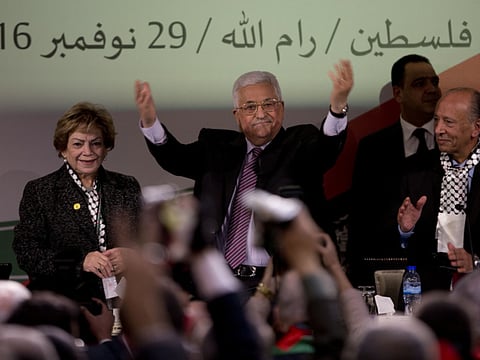Abbas re-elected Fatah leader at rare congress
Palestinian president proposes temporary unity government with Hamas

Ramallah: Palestinian president Mahmud Abbas’s Fatah re-elected him as party head on Tuesday as the movement opened its first congress since 2009 with talk mounting of who will eventually succeed the 81-year-old.
Party spokesman Mahmoud Abu Al Hija said Abbas was re-elected by consensus at the congress attended by some 1,400 delegates in the West Bank city of Ramallah.
The election of members of Fatah’s parliament and its central committee over the five-day congress will signal the direction the oldest Palestinian party will take at a time when Abbas is weakened by his own unpopularity and internal dissent.
While the ageing leader has said he has no intention of stepping aside anytime soon, talk of who will eventually succeed him as Palestinian president has intensified. He has not publicly designated a successor.
Some analysts see the congress as an attempt by Abbas to marginalise political opponents, including longtime rival Mohammad Dahlan.
Observers have seen the reduced number of officials to vote — down from more than 2,000 in 2009 — as part of a move to exclude Dahlan supporters.
Dimitri Diliani, elected to Fatah’s revolutionary council, or parliament, in 2009, said he was not invited to the congress like dozens of others because “we bring a different voice”.
He said a press conference set for a refugee camp near Ramallah on Tuesday with those recently dismissed from the party had been called off after threats “from the security services,” including death threats.
Jibril Rajoub, a former intelligence chief and current head of the Palestinian Football Association and Fatah central committee member, acknowledged “opponents and dissidents” had not been invited, but said “the priority is to hold the congress”.
Rajoub also said the gathering was to provide an opportunity to update the party’s structures.
“The system from the 1960s no longer works in 2016,” he told AFP.
“We have to take into account the current circumstances. The current system was created when we were in the diaspora and we are now on national soil. It was put in place at a revolutionary stage. Now we have a state.”
Meanwhile, Abbas proposed on Wednesday the creation of a temporary unity government along with Hamas, the militant rival faction that controls the Gaza Strip.
In his three-hour address, he sought to push forward long-stalled efforts to reconcile the two major competing Palestinian factions, and to present an image of unity amid wide discord outside the hall where he spoke.
Abbas invited Hamas to send representatives for negotiations to bridge the divide, and he thanked Khalid Meshal, the organisation’s political chief, for offering a supportive message that Abbas passed along to the conference. A month after meeting with Meshal in Qatar, Abbas told his supporters that the two parties should form a joint government to be followed by presidential, legislative and other elections.
“Our national unity is our safety valve, and I call on Hamas to end the division,” Abbas told the party conference. “There will not be a Palestinian state without Gaza.”
Sign up for the Daily Briefing
Get the latest news and updates straight to your inbox



